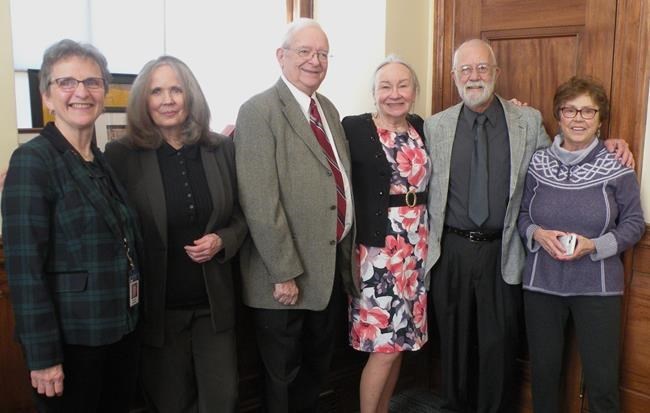
Dr. Fern Desjardins, St. Agatha; (left to right) Cathie Pelletier, Allagash; Richard L'Heureux, Sanford native and Topsham resident; Cecile Thornton, Lewiston; Denis Ledoux, of Lewiston and Lisbon; and previous Hall of Fame inductee Doris Bonneau attend a Francophonie Day event at the Maine State House in Augusta, Maine on Tuesday, March 12, 2024 in a handout photo. THE CANADIAN PRESS/HO-Juliana L'Heureux **MANDATORY CREDIT**
Republished March 18, 2024 - 9:24 AM
Original Publication Date March 17, 2024 - 3:06 AM
MONTREAL - For decades, Cecile Thornton had little motivation to speak French. Born into the minority francophone community in Lewiston, Maine, she says she and her family were often the target of ridicule.
"I was ashamed of my francophone roots," she recalled in a recent phone interview in French. "There were a lot of people who laughed at and mocked us." Thornton, whose maiden name is Desjardins, married an anglophone and didn't teach her children French. It eventually disappeared from her daily life, and she says she lost her ability to converse in the language as a result.
That changed in 2016, when she began attending French-language meet-ups led by local immigrants from West Africa. Thornton says those conversations inspired her to reconnect with her mother tongue. "The African community helped me feel proud to be Franco," she said.
Now 68 years old, Thornton has become an advocate for French speakers in Maine, one of several members of the state's francophone community striving to preserve their language and heritage. They hope a wave of recent African immigration and a growing recognition of the state's Franco-American population will spark renewed interest in their cause. But the number of French speakers in Maine is dwindling, leading some to fear for their future.
Like Thornton, many francophone Mainers decided not to pass down their language in the 20th century. Children who did speak French faced further repression. A 1919 state law that banned education in French "had a long-term impact on how people perceived the value of their language," said Patrick Lacroix, director of the Acadian Archives, housed in the University of Maine at Fort Kent. Maine only repealed the rule in 1969.
U.S. Census Bureau data underline the francophone community's growing vulnerability. The agency estimated that about 30,000 of the more than 1.3 million people in the state spoke French at home in 2022, down from 33,000 in 2018 and from more than 40,000 four years before that.
Don Lévesque, a 76-year-old member of the centuries-old Acadian population in northern Maine, says his outlook on local efforts to promote French changes daily. "Sometimes I'm optimistic, sometimes I'm not," he confessed in an interview.
Lévesque is the president of Le Club Français in the town of Madawaska on the border with New Brunswick. Founded in the 1990s by a group of residents concerned about the survival of their language, Le Club Français now offers French pre-kindergarten and elementary after-school programs, as well as conversational French courses for adults, he said.
Next, the organization wants to create more opportunity for Maine Acadians to develop social lives in French, through such things as community suppers or movie nights. Le Club Français is also planning cultural excursions into New Brunswick, said Lévesque, who now lives in St-Basile, N.B., across the Saint John River from Madawaska.
But engaging younger residents is a challenge, he admitted. "Sometimes I feel like a dinosaur," he said. "The French speaking dinosaur in an English world."
A second French-speaking population, in southern Maine, descends from Canadian immigrants who worked in the area's many mills in the 19th and 20th centuries. Jan Sullivan, a native francophone who leads a French conversation group at the Franco Center of performing arts in Lewiston, says African newcomers have "reawakened" the language in the community.
Though immigration has fuelled a welcome boost to French, it might not be enough to save the language, Sullivan warned. "I think it'll survive for a few more years, several more years," she lamented. "But eventually, I'm afraid it's dying."
Others are resisting the narrative of a culture in inevitable decline. Among them is Susan Pinette, a University of Maine professor and director of its Franco-American Center in the town of Orono, one of several institutions in the state working to publicize the community's history. In an interview, she said the centre aims to counter portrayals of language and cultural loss by highlighting ongoing Franco-American activism.
"The community is changing and that's a good thing," she said. "We don't want (to be) a museum piece of something that's stuck in the past."
Lacroix agreed that what he called the "doom and gloom" narrative often ignores the grassroots efforts that have helped enhance the visibility of Maine's Acadian community and organizations like his that foreground Franco-American heritage. "I think increasingly we are getting the attention of people in the state, which is really the first step even before we can start asking for greater support," he said.
On Tuesday, the Maine legislature hosted a small ceremony to celebrate the state's Francophonie Day. In its resolution proclaiming the holiday, the body cited a "resurgence in the use of the French language and a heightened appreciation of Franco-American heritage throughout the state."
Despite the challenges facing French in Maine, Thornton said she remains hopeful for its future. She also encouraged Quebecers to cherish their connection to the language.
"If people in Quebec, they hold on to their French, they teach their children French, it's going to be a very good thing for the language," she said.
This report by The Canadian Press was first published March 17, 2024.
News from © The Canadian Press, 2024